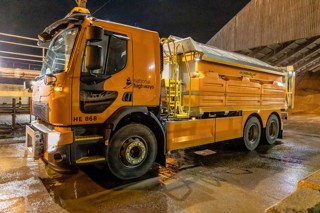Highways England has urged UK motorists to avoid using the hard shoulder to undertake its gritters.
The statement released by Highways England is urging drivers to not take unnecessary risks this winter and only pass a gritter when it is safe to do so, avoiding using the hard shoulder to undertake and checking for hazards ahead.
Highways England’s national winter and severe weather team leader Paul Furlong said: “We care about people getting to their destinations safely and during any severe weather our teams will be working around the clock to keep traffic moving.
“We’re asking drivers to make sure they and their vehicles are also prepared. Before you set out, check your vehicle, the road conditions and the weather forecast.
"If conditions are poor, and journeys are not essential, consider waiting until the weather gets better – this should improve journeys, and give our gritters a chance to treat the roads.''
During severe weather drivers are urged to follow this advice:
- In snow and ice, drivers should stick to the main roads where they can and only travel if necessary
- - drivers are also encouraged to make sure they have a winter kit in their vehicle, including an ice scraper and de-icer, warm clothes and blankets and sunglasses to cope with the low winter sun.
- In high winds, there’s a particular risk to lorries, caravans and motorbikes, so drivers should slow down and avoid using exposed sections of road if possible
- In heavy rain, drivers should keep well back from the vehicle in front, gradually ease off the accelerator if the steering becomes unresponsive, and slow down if the rain and spray from vehicles makes it difficult to see and be seen
- In fog, drivers should switch on their fog lights and not use lights on full beam as the fog will reflect the light back. If you really cannot see, you should consider stopping until it is safe to continue
Highways England’s team of 1,300 specially trained gritter drivers based across the country are geared up for winter and are urging drivers to do the same.
The company responsible for the country’s motorways and main A roads has more than 280,000 tonnes of salt, over 500 salt spreading vehicles ready around the clock to help drivers get to their destinations safely.
Roads minister Jesse Norman said: “It is essential to keep our road network running throughout the winter.
“Highways England has informed us that they are well prepared for adverse weather, with enough salt to cover 610,000 miles of our motorways.
“But the expert advice is clear: drivers need to make their own judgements about road conditions.
"If it doesn’t look safe then they should stay put and travel once weather conditions have improved.”


















Login to comment
Comments
No comments have been made yet.